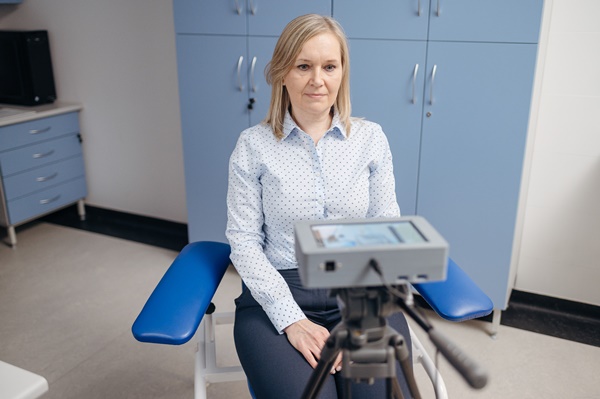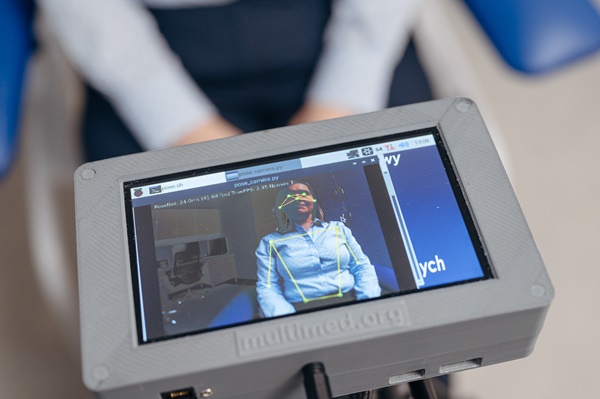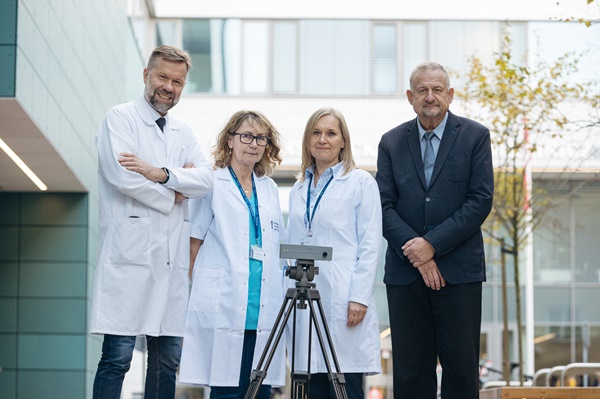An innovative device for fighting Covid-19 developed by the Gdańsk Tech and MUG scientists
Scientists from the Gdańsk University of Technology and the Medical University of Gdańsk developed a device that can increase the effectiveness of the fight against Covid-19 and the diagnosing of patients with respiratory and circulatory problems. CyberRadar is a contactless device enabling medics to safely monitor the patients’ respiration. So far two devices have been produced.
– CyberRadar is a device of small dimensions that can be put in any place in a doctor’s surgery or near the patient’s bed – says Prof. Andrzej Czyżewski, Head of the Department of Multimedia Systems at the Gdańsk University of Technology, who developed the innovative device together with his team. – The device has a microwave sensor placed in a plastic enclosure and a sensitive camera designed to detect the position of the eyes and arms of the patient, and then to “position” the chest. Then, the embedded screen presents the ongoing respiratory and circulatory activity data.
The device has passed the stage of clinical tests, conducted by the Gdańsk Tech and MUG scientists on several dozen patients. Among the patients were both healthy and sick persons, including those with hypertension and other chronic diseases. CyberRadar was also used for examining patients hospitalized at the Clinic of Hypertension and Diabetology of the University Clinical Centre in Gdańsk.
– Clinical trials have shown that CyberRadar is a fully effective device, replacing contact devices, such as respiratory belts, which require direct handling and regular disinfection – explains Prof. Andrzej Czyżewski. –Consequently, CyberRadar can be a fully-fledged and safer alternative for the medical staff in the diagnosing and treatment of patients, while ensuring a higher level of safety for them. There is also a CyberRadar method of blood circulation assessment under development, which would expand its capabilities.

Potential use of CyberRadar
In the case of upsurge of the next wave of the SARS-Cov-2 pandemic, the device developed by the Gdańsk Tech scientists could be widely used to counter its effects. CyberRadar could be used, for example, for monitoring the following patients:
- diagnosed at Hospital Emergency Departments (assessment of indications for admission to hospital),
- hospitalized – CyberRadar enables medics to minimize direct contact, while detecting the deterioration of the patient's condition (e.g. the need to connect them to a respirator), and then to assess the possibility of discharging them from the intensive care unit,
- going through Covid-19 without symptoms and simultaneously staying in home quarantine (remote monitoring of the patient's condition),
- in the future and with wide application, also those treated using telemedicine (e.g. telephone consultation): both with suspected infections and under the care of specialist clinics (mainly internal medicine).

That is not all. The device constructed by the scientists from the Gdańsk University of Technology could also be used after the pandemic has been overcome, e.g. in the diagnostics and monitoring (also at home) of patients with heart failure, lung diseases or after a stroke, as well as – with much higher accuracy than devices available on the market – to detect respiratory disorders while the monitored person is asleep.
– CyberRadar could also be used in future scientific research, combining technical sciences with medicine – emphasises Prof. Krzysztof Narkiewicz, Head of the Department and Clinic of Hypertension and Diabetology, MUG, who also participated in the development of the device. – It enables the examination of a wide group of patients, also in scientific research: through a reliable assessment of the rhythm and respiratory pattern, it could be used to study the regulation of the cardiovascular and respiratory systems.
On 25-26 October this year, CyberRadar was presented by Prof. Andrzej Czyżewski at the "Health of Poles" Congress in Warsaw, where it received favourable reviews from recognized representatives of the medical community. Researchers from the Gdańsk University of Technology are open to the selection of an investor who would like to contribute to the development of the invention, its certification as a medical product, and enable the production of CyberRadar and its widespread introduction to the market.
About the project
The development of CyberRadar is the result of the team of Prof. Andrzej Czyżewski obtaining a grant from the Curium – Combating Coronavirus program, introduced at the Gdańsk University of Technology in spring 2020 as part of the "Excellence Initiative – Research University" program. The aim of the Curium – Combating Coronavirus program is to broaden the knowledge of the mechanism, methods of diagnosis, treatment and prevention of the spread of Covid-19, as well as the use of IT tools in this area. The CyberRadar project was also supported by a grant received by the team of Prof. Krzysztof Narkiewicz from the MUG Rector.
Scientists from the Gdańsk University of Technology and the Medical University of Gdańsk participated in the preparation and development of the functionalities of the device. On the part of the Gdańsk University of Technology, these scientists were: Prof. Andrzej Czyżewski, Prof. B. Kostek, Adam Kurowski, M.Sc. Eng., Andrzej Sroczyński, M.Sc. Eng., Tomasz Śmiałkowski, M.Sc. Eng., Piotr Odya, Ph.D. Eng., Piotr Szczuko, Ph.D. Eng., Arkadiusz Harasimiuk, Ph.D. Eng. The Medical University of Gdańsk was represented by: Prof. Krzysztof Narkiewicz and Beata Graff, MD Ph.D.
The interdisciplinary and close cooperation of the teams of scientists from the Gdańsk University of Technology and the Medical University of Gdańsk is consistent with the idea of the Fahrenheit Universities (FarU), co-created by both universities along with the University of Gdańsk. The establishment of the FarU is the first stage of the future consolidation of the strongest universities in the region, which wish to create one joint and internationally recognized academic centre.
Photo: Bartosz Bańka/Gdańsk Tech


